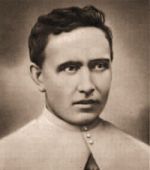Catholic World News News Feature
The new "Black Pope" promises more Jesuit turmoil January 21, 2008
Since Saturday, when Father Adolfo Nicolas was elected by the 35th general congregation of the Society of Jesus, journalists have been describing the new Jesuit superior general as "Arrupe-esque" and "hard to classify." He may be one or the other, but he can't be both. If he is indeed "Arrupe-esque"-- and I suspect he is-- Father Nicolas is not at all difficult to classify.
Father Pedro Arrupe, the superior general 1965 to 1983, presided over a dramatic transformation of the Jesuit order. Don't take my word for it; consider the judgment of Time magazine, which recalls that Arrupe's leadership "saw the rise of radical Jesuit participation in politics, from the anti-war movement in the US in the 1960s to the liberation theology that swept Latin America."
Time understandably accentuates the political activities of the Arrupe era, but liberation theology was not the only cause championed by prominent Jesuits of that generation. The Society of Jesus-- once known for rigorous orthodoxy and loyalty to the Pope-- became a hotbed of theological dissidence, on issues ranging from the nature of the priesthood through the necessity of the Catholic Church to the acceptance of homosexuality.
The last years of Father Arrupe's leadership brought the Jesuits into conflict with the Vatican, and in 1983 the general congregation chose a more careful, diplomatic leader, Father Peter-Hans Kolvenbach. Now, we are told by ranking Jesuit officials, the newly elected superior general combines the discretion of Kolvenbach with the spirit of Arrupe. The available information about Father Nicolas confirms that impression. Like Father Arrupe before him, Father Nicolas has become superior general after serving as Jesuit provincial in Japan. Again like Arrupe, he has been profoundly shaped by his long experience and sympathy with Asian culture.
That last item is significant, because among Catholic theologians in Asia, there is a strong tendency to recognize the wisdom of traditional Asian religions. Last year, in remarks to the Jesuit publication Express, Father Nicolas himself said that "the West does not have a monopoly on meaning and spirituality, and can learn a lot from the experience of Asian cultures.'
Fair enough; we can certainly learn from Asian wisdom. But more to the point, can Asians learn from the wisdom of the Church? Father Nicolas addressed that question, too, referring specifically to the famous Spiritual Exercises of St. Ignatius, the founder of the Jesuit order. "The question is how to give the Ignatian experience to a Buddhist," Father Nicolas said. "Not maybe formulated in Christian terms, which is what Ignatius asked, but to go to the core of the experience."
How can one "go to the core of the experience" of Ignatian spirituality without speaking in Christian terms? That is the question the Jesuit order now confronts.
It is also a question Benedict XVI has confronted repeatedly during the first few years of his pontificate. Again and again, through his own work and through statements from the Congregation for the Doctrine of the Faith, the Holy Father has warned against the dangers of religious indifferentism and reminded the faithful that the Catholic Church is the one true Church, the single reliable means of attaining salvation.
On that key theological issue-- the unique and irreplaceable role of the Catholic Church in the economy of salvation-- the statements of Pope Benedict are frequent, simple, clear, and strong. The same cannot be said of Father Nicolas.
According to informed sources in Rome, the lack of clarity in the theological expressions of Father Nicolas raised enough eyebrows at the Vatican to scuttle his chances to become rector of the Gregorian University in 1999. (In his typically insightful column on the new Jesuit superior, John Allen of the National Catholic Reporter alludes to these reports-- although he cites slightly different grounds for the Vatican's uneasiness. Allen, incidentally, has no trouble classifying the new superior general as "progressive.")
Pope Benedict evidently is not frightened by the prospect of another "Arrupe-esque" Jesuit leader ; he approved the selection of the "Black Pope." But the Pope is unlikely to see the new superior general as a staunch ally in this key theological dispute.
One more observation: Father Nicolas, at 71, is the 2nd-oldest man ever elected to head the Society of Jesus. That is fitting, because the entire Jesuit order has been aging rapidly since the onset of the Arrupe era. Troubled by desertions, unable to attract enough young men to fill the vacancies created by deaths and departures, the order as a whole is showing the signs of old age: shrinking in size, diminishing in vigor. The election of Father Nicolas appears to be a deliberate choice by Jesuit leaders-- predicted here when the general congregation began-- to continue barreling down the road toward extinction.






